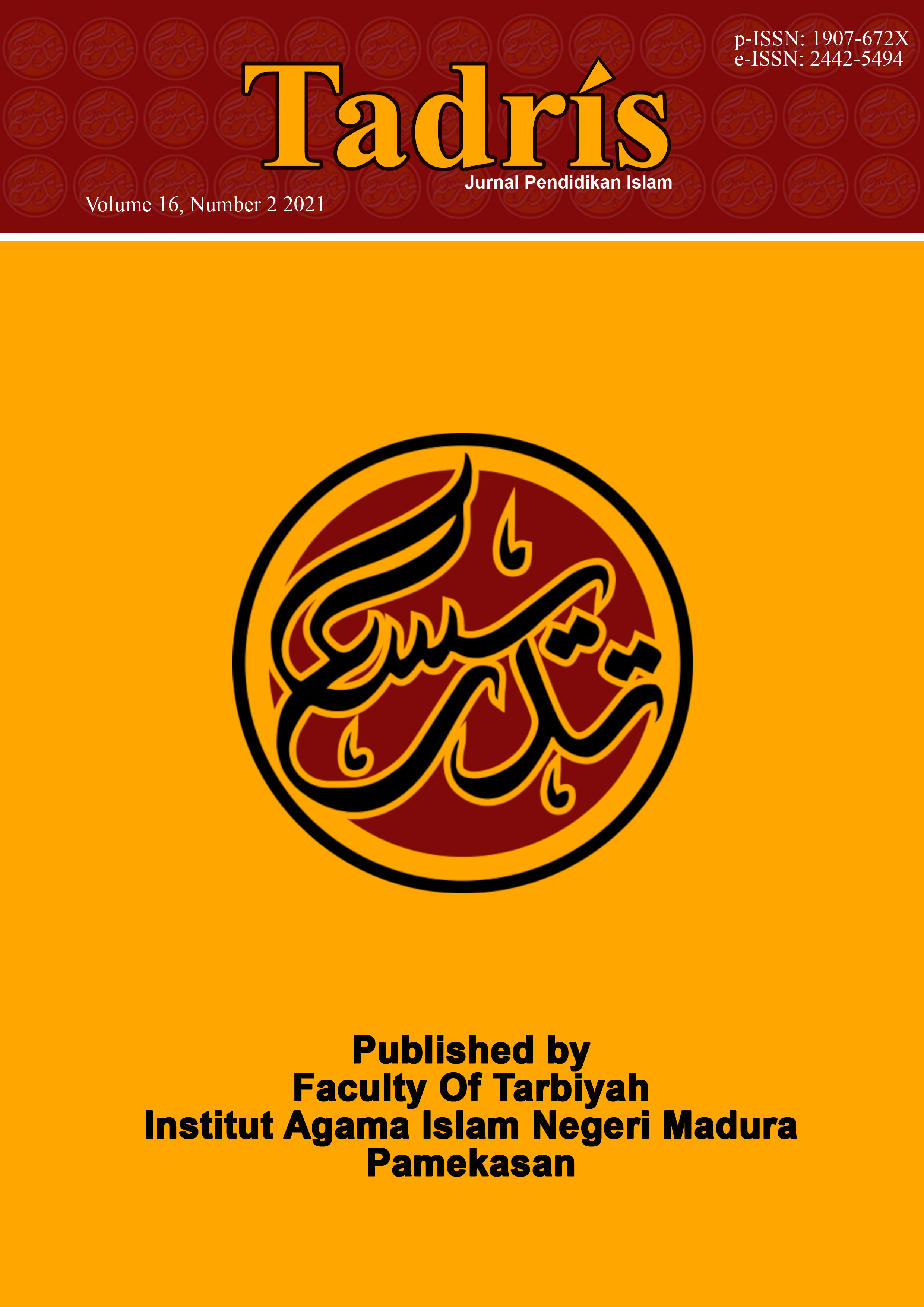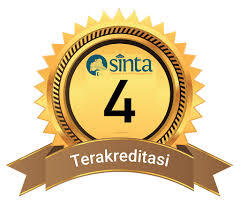The Implementation of School Literacy Movement in the Perspective of Mortimer Adler and Charles Van Doren
 Abstract views: 1115
,
Abstract views: 1115
,
 PDF downloads: 534
PDF downloads: 534
Abstract
This study aims to describe the implementation of the SLM in MTsN 2 Kediri City , the benefits of applying SLM, the constraints faced , and to analyze the implementation of the SLM with reading theory from Mortimer Adler and Charles Van Doren. The research method used was qualitative with the type of case study research. The subjects of this study were the school principal, deputy school principal in the curriculum, Indonesian Language teachers, and students. Data obtained through in- depth interviews, observation, and documentation. Next data were analyzed using the Miles and Huberman model which included the stages of selecting data, presenting data, and drawing conclusions. To check the validity of the data, researchers extended the observation and triangulation of sources and data collection techniques. The results of this study are: 1) The SLM in MtsN 2 Kediri City is implemented through reading corner activities; Wall magazine; environmental conditioning that is full of motivational sentences; habit of reading the Qur'an; as well as assignments on Indonesian Language subjects, the form of assignments such as: summarizing some types of books such as old novels, biographies, fantasy stories and popular knowledge; 2) The benefits of implementing this program are students being diligent in reading, trained in composing sentences, getting to know the types of books, and increasing their knowledge; 3) The constraints faced this program are the lack of available reading material in the library; students have difficulty in getting the type of books required; and difficulties in summarizing thick books; and 4) The implementation of SLM in MTsN 2 Kediri City is categorized in the third level of reading theory of Mortimer Adler and Charles Van Doren. It can be seen from the type of task assigned for participants learners to review book until the analysis, it is to display the advantages as well as the shortage of books read.
Downloads
References
Adler, Mortimer J., and Charles Van Doren. How To Read A Book, The Classic Guide To Intelligent Reading. Chicago, 1965.
Antasari, I.W. “Implementasi Gerakan Literasi Sekolah Tahap Pembiasaan Di MI Muhammadiyah Gandatapa Sumbang Banyumas.” Jurnal Libria IAIN Purwokerto 9, no. 1 (2017): 13–26.
Antoro, Billy. Gerakan Literasi Sekolah, Dari Pucuk Hingga Akar: Sebuah Refleksi. Jakarta: Kementerian Pendidikan dan Kebudayaan, 2017.
Aswat, Hijrawatil, and Andi Lely Nurmaya. “Analisis Gerakan Literasi Pojok Baca Kelas Terhadap Eksistensi Daya Baca Anak Di Sekolah Dasar.” Jurnal Basicedu: Research and Learning in Elementary Education 4, no. 1 (2020): 70–78.
Cresswell, J. W. Research Design Pendekatan Metode Kualitatif, Kuantitatif, Dan Campuran. Yogyakarta: Pustaka Pelajar, 2016.
Dharma, Ketut Budi. “Implementasi Gerakan Literasi Sekolah Dalam Menumbuhkan Minat Baca Siswa Sekolah Dasar.” Jurnal Edukasi Nonformal 1, no. 2 (2020): 70–76.
Endaryanta, E. “Implementasi Program Gerakan Literasi Sekolah Di SD Kristen Kalam Kudus Dan SD Muhammadiyah Suronatan.” Jurnal Kebijakan Pendidikan UNY VI, no. 7 (2017): 732–744.
Fixen, Dean. Implementing Literacy Programs to Improve Student Achievement. Washington: Department of Education, 2012.
Genlott, Annika Agelii, and Ake Gronlund. “Improving Literacy Skills Through Learning Reading by Writing: The IWTR Method Presented and Tested.” Journal of Computers and Education 67 (2013): 98–104.
Hidayat, Muhammad Hilal, Imam Agus Basuki, and Sa’dun Akbar. “Gerakan Literasi Sekolah Di Sekolah Dasar.” Jurnal Pendidikan: Teori, Penelitian, dan Pengembangan 3, no. 6 (2018): 810–817. http://journal.um.ac.id/index.php/jptpp/.
Huda, F. “Peran Kegiatan Literasi Dalam Meningkatkan Minat Baca Dan Menulis Siswa Sekolah Dasar.” Jurnal JPSD STKIP Sebelas April Sumedang 3, no. 1 (2017): 42–52.
Kemendikbud. Permendikbud Nomor 23 Tahun 2015 Tentang Penumbuhan Budi Pekerti. Jakarta: Kementerian Pendidikan dan Kebudayaan, 2015.
———. Permendikbud Nomor 23 Tahun 2015 Tentang Penumbuhan Budi Pekerti. Jakarta: Kemendikbud, 2015.
Khairuddiniyah. “The Implementation of Literacy Strategies in Teaching English by the English Teacher at MAN Insan Cindekia Padang Pariaman.” English Education: Jurnal Tadris Bahasa Inggris 10, no. 2 (2017): 242–257.
Laksono, Kisyani. Manual Pendukung Pelaksanaan Gerakan Literasi Sekolah: Untuk Jenjang Sekolah Menengah Pertama. Jakarta: Direktorat Pembinaan SMP, 2016.
Magdalena, Ina, Maruf Akbar, Robinson Situmorang, and Asih Rosnaningsih. “Evaluasi Program Gerakan Literasi Sekolah Di Sekolah Dasar Wilayah Kota Dan Kabupaten Tangerang.” Pendas: Jurnal Ilmiah Pendidikan Dasar IV, no. 2 (2019): 230–248.
Maya, Rahendra, and Ulil Amri Syafri. “Spirit Literasi Perspektif Al-Muqaddam: Analisis Model Berliterasi Muhammad Ibn Ismail Al-Muqaddam.” Edukasi Islami: Jurnal Pendidikan Islam 9, no. 1 (2020): 239–255.
Miles, M.B., A.M. Huberman, and Johnny Saldana. Qualitative Data Analysis: A Methods Sourcebook. Jakarta: UI-Press, 2014.
Muhammadi, Taufina, and Candra. “Literasi Membaca Untuk Memantapkan Nilai Sosial Siswa SD.” Litera 17, no. 2 (2018): 202–212.
Munimah. “Manajemen Program Literasi Dalam Meningkatkan Minat Baca Siswa (Studi Multi Kasus Pada SD Dan MTs Di Kabupaten Pasuruan).” Universitas Negeri Malang, 2017.
Nurkaeti, Nunuy, Sani Aryanto, and Yosi Gumala. “Read Aloud: An Literacy Activity in Elementary School.” Primaryedu: Journal of Elementary Education 3, no. 2 (2019): 55–61.
OECD. “Reading Performance PISA 2015.” Retrieved from Https://Data.Oecd.Org/Pisa/Reading-Performance-Pisa/.
Pilgreen, Janice L. The SSR Handbook: How To Organize and Manage a Sustained Silent Reading Program. Australia: Boynton/Cook Publisher, 2000.
Pradana, Fransiska Ayuka Putri. “Pengaruh Budaya Literasi Sekolah Melalui Pemanfaatan Sudut Baca Terhadap Minat Membaca Siswa Di Sekolah Dasar.” Jurnal Pendidikan dan Konseling 1, no. 2 (2020): 94–104.
Rahman, Syaiful, and Akhsanul In’am. “Pola Implementasi Gerakan Literasi Sekolah Di SMPN 5 Malang.” Jurnal Kebijakan dan Pengembangan Pendidikan 8, no. 1 (2020).
Ramandanu, Febriana. “Gerakan Literasi Sekolah Melalui Pemanfaatan Sudut Baca Kelas Sebagai Sarana Alternatif Penumbuhan Minat Baca Siswa.” Jurnal Mimbar Ilmu Universitas Pendidikan Ganesha 24, no. 1 (2019): 10–19.
Walipah, Eva, Rahman, Wahyu Sopandi, and Atep Sujana. “School Literacy Movement in the Industrial Revolution Era 4.0 in Building Speed Reading Skills.” In The 2nd International Conference on Elementary Education, 1763–1770, 2020.
Wiratsiwi, Wendri. “Penerapan Gerakan Literasi Sekolah Di Sekolah Dasar.” Refleksi Edukatika: Jurnal Ilmiah Kependidikan 10, no. 2 (2020): 230–238.
Wulandari, R. “Implementasi Kebijakan Gerakan Literasi Sekolah Di Sekolah Dasar Islam Terpadu Lukman Al Hakim Internasional.” Jurnal Kebijakan Pendidikan UNY VI, no. 3 (2017): 319–330.
Yin, Robert K. Case Study Research Design and Methods. California: Sage, 2009.
Yulianto, B., F. Jannah, and Nurhidayah. “The Implementation of School Literacy Movement in Elementary School.” In 1st International Conference on Education Innovation (ICEI 2017), 173:43–46. Atlantis Press, 2017.
Copyright (c) 2021 TADRIS: Jurnal Pendidikan Islam

This work is licensed under a Creative Commons Attribution-NonCommercial 4.0 International License.
The journal operates an Open Access policy under a Creative Commons Non-Commercial 4.0 International license. Authors who publish with this journal agree to the following terms:
- Authors retain copyright and grant the journal right of first publication with the work simultaneously licensed under a
 Commons Attribution-NonCommercial 4.0 International License
Commons Attribution-NonCommercial 4.0 International Licensethat allows others to share — copy and redistribute the material in any medium or format, and adapt — remix, transform, and build upon the material.
- Authors are able to enter into separate, additional contractual arrangements for the non-exclusive distribution of the journal's published version of the work (e.g., post it to an institutional repository or publish it in a book), with an acknowledgement of its initial publication in this journal.
- Authors are permitted and encouraged to post their work online (e.g., in institutional repositories or on their website) prior to and during the submission process, as it can lead to productive exchanges, as well as earlier and greater citation of published work (see The Effect of Open Access).














